

Conectivismo em Linguagem Simples. Overview of connectivism - Dr George Siemens. Elearnspace. Connectivism: A Learning Theory for the Digital Age. Connectivism: A Learning Theory for the Digital Age December 12, 2004 George Siemens Update (April 5, 2005): I've added a website to explore this concept at www.connectivism.ca Introduction Behaviorism, cognitivism, and constructivism are the three broad learning theories most often utilized in the creation of instructional environments.
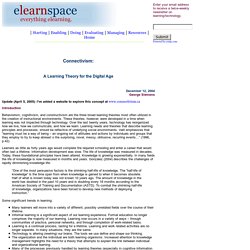
Learners as little as forty years ago would complete the required schooling and enter a career that would often last a lifetime. “One of the most persuasive factors is the shrinking half-life of knowledge. Some significant trends in learning: Many learners will move into a variety of different, possibly unrelated fields over the course of their lifetime. Background. Conectivismo%5Bsiemens%5D.pdf. Welcome to Connectivism! — Connectivism. Half an Hour: What Connectivism Is. Posted to the Connectivism Conference forum (which hits a login window - click 'login as guest' (middle of the left-hand column) - I'm sorry, and I have already complained to the conference organizer).
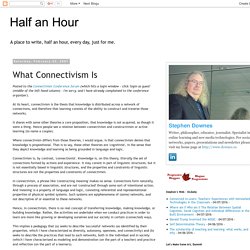
At its heart, connectivism is the thesis that knowledge is distributed across a network of connections, and therefore that learning consists of the ability to construct and traverse those networks. It shares with some other theories a core proposition, that knowledge is not acquired, as though it were a thing. Hence people see a relation between connectivism and constructivism or active learning (to name a couple). Where connectivism differs from those theories, I would argue, is that connectivism denies that knowledge is propositional.
That is to say, these other theories are 'cognitivist', in the sense that they depict knowledge and learning as being grounded in language and logic. Connectivism is, by contrast, 'connectionist'. Response to comments by Tony Forster. My eBooks. ¿Es el “conectivismo” una teoría? ¿Lo es del aprendizaje? (I) Miguel Zapata Esta entrada del blog, y las que le siguen, están elaboradas a partir de un trabajo extenso donde pretendemos dar una visión acerca de lo que son las teorías y modelos sobre el aprendizaje y contraponerla o contrastarla de forma analítica con sistemas estructurados de ideas que, sin ser teorías ni modelos, están siendo aceptados como tales en determinados entornos.
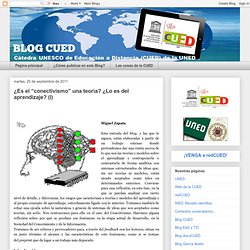
Conviene pues una reflexión, en esta fase, en la que se puedan analizar con cierto nivel de detalle, y diferenciar, los rasgos que caracterizan a teorías y modelos del aprendizaje y al propio concepto de aprendizaje, estrechamente ligado con lo anterior. Tratamos también de echar una ojeada sobre la naturaleza y génesis de sistemas de ideas que son aceptados como teorías, sin serlo. Nos centraremos para ello en el caso del Conectivismo. Haremos alguna reflexión sobre por qué se produce ese fenómeno en la etapa actual de desarrollo, en del Conocimiento y de Introducción. Consideraciones generales. Conectivismo. Welcome to CCK11 ~ CCK11. A new classification for MOOCs – Gráinne Conole. Gráinne Conole is Professor of learning innovation at the University of Leicester.
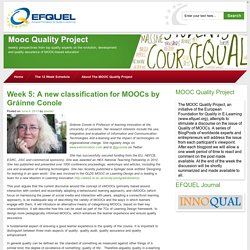
Her research interests include the use, integration and evaluation of Information and Communication Technologies and e-learning and the impact of technologies on organisational change. She regularly blogs on www.e4innovation.com and is @gconole on Twitter. She has successfully secured funding from the EU, HEFCE, ESRC, JISC and commercial sponsors). She was awarded an HEA National Teaching Fellowship in 2012. She has published and presented over 1000 conference proceedings, workshops and articles, including the use and evaluation of learning technologies. A fundamental aspect of ensuring a good learner experience is the quality of the course.
Digital Badges / Open Badges Taxonomy. Working on the taxonomy of digital badges / open badges is an interesting empirical and conceptual endeavour.
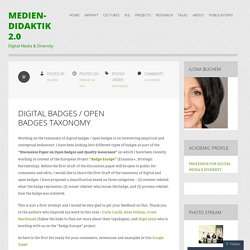
I have been looking into different types of badges as part of the “Discussion Paper on Open Badges and Quality Assurance” on which I have been recently working in context of the European Project “Badge Europe” (Erasmus+, Strategic Partnership). Before the first draft of the discussion paper will be open to public for comments and edits, I would like to share the first draft of the taxonomy of digital and open badges. I have proposed a classification based on three categories – (1) content-related: what the badge represents, (2) issuer-related: who issues the badge, and (3) process-related: how the badge was achieved. This is just a first attempt and I would be very glad to get your feedback on this. So here is the first list ready for your comments, extensions and examples in this Google Table! PPGIE - Programa de Pós-Graduação em Informática na Educação - UFRGS. Súmula: Súmula/ementa: Ideias e aplicações do projeto conectivista.
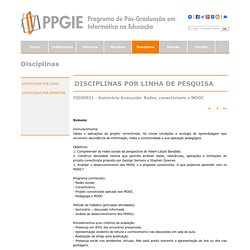
As novas condições e ecologia de aprendizagem que envolvem abundância de informação, redes e conectividade e sua aplicação pedagógica. Objetivos: 1. Compreender as redes sociais da perspectiva de Albert-László Barabási. 2. Construir densidade teórica que permita analisar ideias, relevâncias, aplicações e limitações do projeto conectivista proposto por George Siemens e Stephen Downes. 3.
Communities of practice and social learning systems. Sir Ken Robinson - TED 2006 - As escolas acabam com a criatividade.